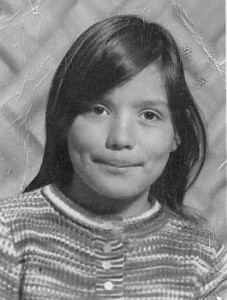The Psychic Blockade
I heard it, in my head, every day. Often it resonated hundreds of times a day. It was said by a well-meaning teacher, who had no idea the weight of a few simple words. As a nine-year-old, broken-hearted girl, I took those words as wisdom and gospel. Simple really. “Don’t cry,” later coupled with a dollop of guilt, “…or you’ll make someone else feel sad.” That’s it. But what I heard stuck with me like a mantra and eventually transformed over the years.
Four Whys for this Marriage
A little background – I’m fuzzy on the dates, but somewhere around 1967 or so, my parents separated then divorced. I recall sound bites of hope, my eternal optimism, generated mostly from my father: “…nothing will change…I’ll see you every weekend…it won’t be any different, really.” Yet my father immediately moved in with his new girlfriend and then married her in short order. Everything was different. All those platitudes divorcing parents shower onto the too young, well, that was all crap and lies. If I hadn’t been so young and unknowing, I would’ve said, “please, spare me the falsities and senseless hope, give it to me straight.” My mother remarried about a year or so later.
After a couple years or so, I swam in the hopelessness of the reunited “first family” structure. So I designed a new hope – that my new family structure would include a genial partnership containing my biological father, new stepfather, mother, brothers and new baby sister. (In an unsympathetic manner, I cut out my biological father’s adopted family which included his wife and four children.) I invested all my emotional worth on this, because 1) I saw no other options and 2) I figured this would make everyone happy. Well, almost everyone.
Before the breakup, I had been well aware of the negative atmosphere in my first family home life. I heard the yelling (mostly my father), I smelled the constant beer breath on my father, and I was well aware that those overly friendly “aunts” were not aunts of mine as introduced by my father. Being just a small child, I loved each of my parents so deeply, that I accepted my father’s abuse toward my mother as typical family behavior. Father m.i.a.? Normal. Drunken father breaking things? Normal. Being picked up in grade school by father and a heavily makeup and perfumed ‘aunt-friend’? Normal. It was only surprising that my parents’ marriage lasted about eight or so years. Myself and my three brothers are the four good things that resulted from this marriage.
Ah-Ha! He Lied!

I think it was when my mom giving birth to my baby sister a year after marrying my step father, that I came to the realization that this was a permanent revamping of the family structure. Hey, I was thrilled to death to have this baby sister. She was cute, interesting, very small and I had always wanted a sister to play Barbies with, so it really seemed like a good idea. Regardless, my 9-year-old heart was still broken and I cried nearly every night. In secret. I prayed, too. “Hey, God, can you somehow find a way to put my daddy back into this family?” But every day it didn’t happen. This pain was compounded by my biological father’s newly adopted attitude that visiting me and my three brothers was not a priority. He had has own new family to pal around with. He didn’t show up for visiting day. I’m not going to draw up that scenario, because you can already imagine it, and I’m not begging for pity. It’s just a fact. Those platitudes my father tossed our way, well, they were actually bald-faced lies.
The Power of Don’t
So back to that crying. I tried to keep it a private affair, so as not to disturb anyone. I wasn’t too slick with hiding my pain, and so I was caught. Once. Crying in public. That was when I received the badge of shame, “Don’t cry. I know you miss your father, but you have a new father. You don’t want to hurt his feelings, do you?” Yea, she was right. Who was I to unleash my pain? It disturbed people. It made them uncomfortable. It had the potential to hurt people. How could I do that? You know what? I’m in my fifties now. And I still hear those words don’t cry, except now I understand the metamorphosis from a potential savior of protection for the sake of the family to a negative personality trait that manages to beat me up everyday. Over the years, don’t cry has run through my head in a billion configurations – when I entered into relationships, when I tried to write, when I tried to create art, when I got married, when I got divorced, when I got married a second time, when I gave birth to children, and when I watched my biological father die. Here is what played in my head:
Don’t let him or her know how you really feel.
Don’t let yourself feel pain or show it.
Don’t talk about problems or issues with the people you care about.
Don’t let anyone know you’re sad.
Don’t be expressive.
Don’t be creative.
Don’t be emotive.
Hide your feelings. Hide your pain and sorrow. Care more about how it affects others than yourself.
What Eddie’s Mother Knew
The same year I was told, “don’t cry” was when I decided I wanted to be a mother. I’m not sure why I wanted to be a mother, and I certainly didn’t know the mechanics of how to achieve this, but I knew I needed a child. Not a baby. My new sister looked to be too high maintenance and too mysterious. And I really didn’t want to change poopy diapers. I decided I’d mother an adorable two-year-old named Eddie.
Eddie was a beautiful boy, with sandy brown hair, blue eyes that vaguely resembled his Vietnamese mother, and the cutest mannerisms with his chubby hands. He and his four-year-old brother, James, lived directly above my family’s military housing unit. The boys’ father was a blond-haired, blue-eyed Marine from Oklahoma. People in our complex were quite rude to Eddie’s mother, so she mostly stayed indoors. Eddie was usually encouraged to play outdoors in the children’s common area in the late afternoon. After school I’d go home, change into my play clothes, pop upstairs to retrieve Eddie and James and bring them to the play area. I’d always push Eddie on the swing, while James would play on the slide. Eddie’s mother could watch us from her upstairs window.
I was practicing the art of child-mothering (basically just bossing the boy around) when Eddie fell off the swing – my bad – and onto the compacted dirt below, unleashing a wail as if he’d been hit with a baseball bat. I froze – sans maternal instinct kicking in. Just stood there, looking at the wailing Eddie. James continued climbing the slide, ignoring the commotion, not wanting to miss a minute of play time.
Eddie’s mother came running toward us, and stopped in front of the crying Eddie. She put her hand out, and Eddie smacked it away, now crying even more loudly. She put her hand out again, and after a few minutes, Eddie, hiccupping and wiping snot with his right hand put his left hand on top of his mother’s. He moved closer toward his mother, and fell full body into his mother’s arms. His muffled crying slowly stopped, and his mother patted him. She said a few words in Vietnamese. Eddie lifted his face, wiped his snot and tears again, this time on her apron, then turned and ran right back to the swingset. His mother returned to her apartment.
I’m not mother material yet. There was no way I understood what had happened between those two and I certainly wasn’t going to have snot wiped on me.
The Wayback Machine Works Its Magic
The ramifications of two words (heck, the one word, “don’t” is probably enough) were intense. But I’m happy to report that I’ve managed to dredge up that teacher’s gift to me, and rework it by going into my own Wayback Machine. So let’s do that together, cool?
Going Back: Replay and Rework that Psychic Block
Replay those words, picture the event, the person who said what they said, HOWEVER, re-word their critiscm/statement/demand/commandment to something positive, loving, accepting and healing:
Terese: Age 9, crying in school
Teacher: “Oh, Terese, you’re sad? You miss your father? Your heart is broken? It’s okay to cry. It’s okay,” teacher then gives me a big ‘ol hug.
Terese: Feels the love and healing, then runs off to play foursquare with Rachel Gonsalez and others. (Later, I can see myself drawing on a huge sheet of paper – a crayon rendering of a frog, and the biggest worry I have is if I have enough green crayon to do the job.)
Today I see that I can take ownership of that (past) negative, impactful phrase. I can recognize it had a place, that the giver’s intention was something completely different, and then I examine its worth to me.
Did it have value to me? Do I need those words in my life? Nope? Buh-bye. Time to move on.
The Brilliance of Eddie’s Mother
I imagine now, that Eddie’s mother, understood Eddie was in physical pain. He needed to express it. She offered to hold him by reaching out to him, and when he was ready, she was there for him. He seized the opportunity to help himself feel better. And when he was done, I imagine his mother said to him “it’s okay to cry, and when you’re feeling better, get back on that swingset and have fun.”
Addendum: Eddie is now aged 50 and has been a self-made billionaire since age 26. He owns several jets, a software company that continues to grow exponentially, and frequently vacations in Vietnam, Africa and all over South America. Naw...just kidding. I have no idea whatever happened to Eddie.
